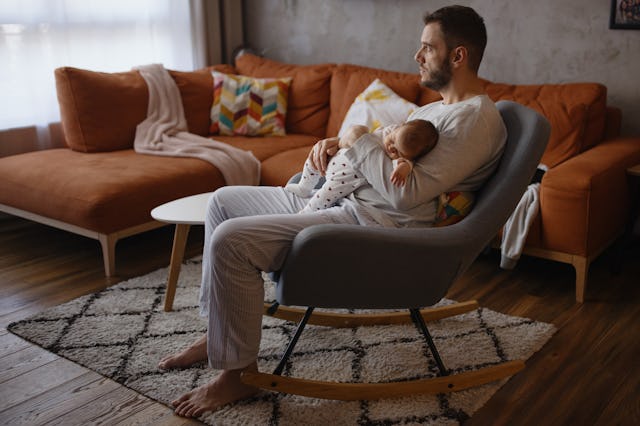Yes, New Dads Can Get Postpartum Depression Too
There are resources available to help.

When picturing the baby blues, automatically the image of the tired mom — disheveled and un-showered — comes to mind. According to the CDC, about 1 in 8 women nationally experience some symptoms of postpartum depression. The constant night wakings, shift in family dynamic, and adjustment to new roles in the home is enough to stress anyone out. And dads are often overlooked when these emotional changes are discussed. But paternal postpartum depression is a very real thing.
With the ongoing pandemic, dads are being faced with the realities of everyday life in the same ways moms are. Dads are spending more time at home, and some have taken on the roles of caregiver as moms return to work. Exhaustion, stress and general feelings of helplessness in adjusting to their new role are all contributing factors to depression. Couple that with having a newborn and hormonal fluctuations — yes, men have those too — and you can assume men have been experiencing PPND (paternal postpartum depression) at growing rates.
Symptoms of postpartum depression can present themselves differently in men than in women.
According to Cleveland Clinic, some of the more common signs of postpartum depression in men include:
- Acting angry, irritable, or aggressive
- Losing interest in activities they typically love
- Working much more than usual
- Being distant or withdrawn around family and friends
- Having feelings of frustration, discouragement, or cynicism
- Having feelings of sadness, hopelessness, or feeling overwhelmed
Research also states that men who have a history of depression as well as have partners experiencing postpartum symptoms are more likely to experience postpartum depression.
How common is paternal postpartum depression?
A report in the Journal of the American Medical Association found that 10 percent of men worldwide showed signs of depression beginning in pregnancy, from the first trimester all the way through six months after the baby was born. The number jumped to 26 percent during the three- to six-month period after the baby’s arrival. A 2014 study published in Pediatrics found that depression among new dads increases by 68 percent during the first five years of a baby’s life.
Studies surrounding male postpartum depression have proven to be inconsistent for a number of reasons. Mainly, men are less likely to admit when they’re upset or experiencing symptoms of depression. This could be due to societal views of “manliness” and how men are supposed to deal with their emotions. On the other hand, depression is less recognized in men because it usually manifests in the symptoms mentioned above and not the typical “sadness.”
There are resources out there for dads that want to seek help.
Like with any mental health concerns, if you or a loved one are showing signs of depression, you should speak with a counselor or other health professional. There is no shame in seeking help from a professional who may be able to provide you with medication if necessary. There are also online resources you can check out for more information on postpartum depression in men:
There are also support groups for men that want to share and learn ways to cope from other parents. Either way, talking through your emotions with your partner can help you both realize that you are not alone. And if your symptoms are prolonged, you should reach out for professional help.
Becoming a new parent is a beautiful and life-changing experience. But it also comes with added pressures for both parents — and the sooner we normalize dads seeking help, the better off families will be.
This article was originally published on